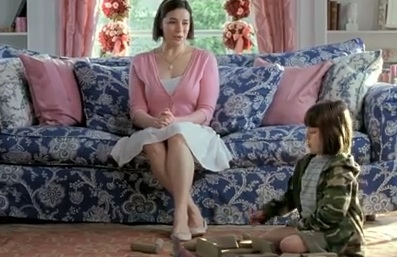A recent Tide commercial featuring gender non-conformity by a girl has really struck a chord, judging by the ten submissions we got of it. In the ad, a mother wearing a pink sweater, sitting in a room accented in pink, nervously bemoans the fact that her daughter, who is wearing a camouflage hoodie and playing with wooden blocks, doesn’t like the trappings of femininity — specifically, she doesn’t like pink and she does like cargo shorts:
The commercial clearly illustrates the emphasis on gender conformity and the way parents may feel discomfort if their child won’t conform. The mother is clearly distressed that the “pink thing” didn’t work with her daughter, and we’re to assume that she worked hard to try to convince her to act more traditionally feminine but has slowly given up in the face of her daughter’s disinterest. The little girl eschews femininity at the cost of disappointing her mom. As someone who absolutely hated dresses as a kid myself, I remember that feeling that hopeful look on my mom’s face when she’d hold up a dress, hoping that somehow this one would win me over, and the knowledge I was somehow hurting her by rejecting it.
Yet as several of the submitters point out, the commercial also undermines this emphasis on gender conformity, even while presenting having an unfeminine girl as an exasperating situation for a mom. Unlike some ads we’ve seen that present the product as helping you raise a child who meets gender norms, here, the product does just the opposite: it saves the little girl’s clothes, which the mother kind of wishes had been ruined. In the end, the mother, though clearly less than thrilled, praises her daughter’s parking garage. As Melissa M. says,
On one hand, we see a child neither conforming nor being forced to conform to styles attributed to their gender role, though on the other hand we see a mother obsessively sticking to her role and being painted in the light of a harrowed mother, desperately trying to help her child fit in.
Thanks to Miss B., George McHenry Jr. (a doctoral candidate at the University of Utah), Tiffany D., Ulysses H., Leiana S., Sarah R., Melissa M., Felice S., Allison C., and Mary Ann C. for the tip!
Transcript after the jump, thanks to Ulysses.







